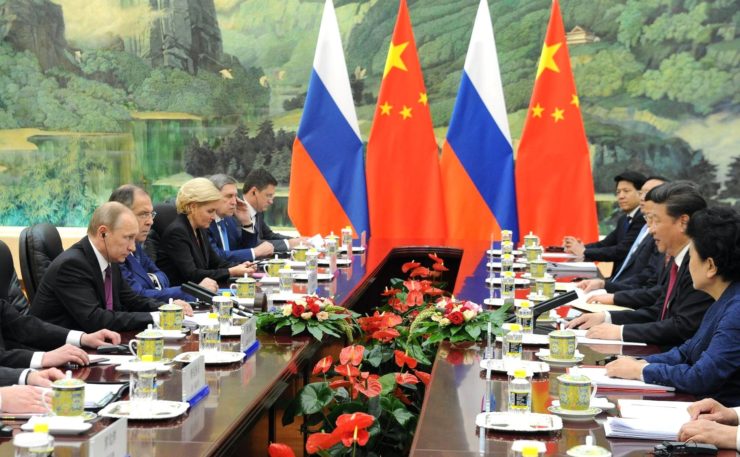
The recent visit of Chinese President Xi Jinping to Russia, the talks between the leaders of both nations, and the signed agreements have sparked significant interest in Middle Eastern media. Observers are analyzing the event’s course and outcome, its impact on the region and the world, and its contribution to the development of relations between the two great powers.
Commentators have highlighted the historical dimension of Moscow-Beijing ties, which date back many years to when both countries stood together against the West. One Emirati analyst recalls how, in the early 1970s, Washington exploited gaps in the “Chinese wall” to weaken the Soviet Union and its foreign policy positions. However, it seems that the two great powers have learned from this experience.
With the Ukraine crisis, Washington has brought the intricate economic and political connections between Europe and Russia to the brink of collapse. Still, despite its efforts to disrupt relations between Moscow and Beijing, it has not succeeded.1
As per a local author, the President of the People’s Republic of China, who has recently visited Russia, is aware that the West’s objective is not only Russia but China as well, and that the latter’s defense begins with Ukraine.2 Beijing understands the idiosyncrasies of Washington’s strategic plan and the fact that it perceives China as a potential adversary due to the “latent Chinese power”… Therefore, Beijing requires an international support system that it can depend on for potential tools and resources in the event of a possible conflict.
America has “drummed up confrontation with China and Russia.” It did not heed the warnings of some of its experts. And China and Russia had no choice but to “deepen their strategic partnership,” according to a prominent Lebanese media figure.3
The prevailing notion in Middle Eastern media is that China needs Russia, just as much as Russia needs China, and the two nations are endeavoring to shake off the age-old dominance of the dollar, which is the primary instrument of American influence on the global stage. Although it will not happen overnight, the process is already underway.
The Russian and Chinese sides have integrated their bilateral and multilateral connections into the tapestry of regional and international partnerships, particularly with the BRICS, the Shanghai Cooperation Organization, and others. Notwithstanding the economic sanctions imposed on Moscow, numerous trade and economic agreements worth over $100 billion have been reached in recent years. These agreements serve as a channel for the Russian economy.
The recent summit in Moscow is also perceived by Arab commentators through the prism of the growth of diverse Sino-Arab ties. It is clear that the center of the world economy is shifting to the east, towards Asia. The energy markets of the Persian Gulf countries are oriented from west to east, and the main flows of their oil and gas are directed to China and Asian countries, not to America and Europe. Today, the economies of the Arabian countries are more connected than ever with China, which since 2020 has become their largest trading partner, replacing the European Union in this regard.
These countries see in the development of their relations with Beijing a factor in favor of easing the US-Western pressure on them. A noticeable resonance was caused by Beijing’s sponsorship in the signing of a recent agreement between Riyadh and Tehran on the resumption of diplomatic relations between them.
Such mediation between the Kingdom of Saudi Arabia and Iran and Russia’s role in working to resolve the problems between Turkey and Syria, and through it between Syria and other countries in the region, highlight the signs of a Sino-Russian project. It is aimed at establishing a new basis for international relations in the Middle East, different in form and content from what the United States tried to do. Sino-Russian efforts aim to push the region toward integration and peaceful settlement of differences.
One can be sure, a Lebanese publication summarizes, that “mature, stable and strong relations between the two powerful countries are needed by the whole world.” The two countries look comprehensively at planetary problems – from trade to economic relations, demonstrate a generally identical assessment of the exacerbated political problems of the world through the fault of Washington.
On an economic and financial level, it is clear that both countries are openly and directly challenging the dollar. The goal is to free itself from its dominance in the world’s reserve currencies and in trade, especially in energy markets. The success of this mission will lead to a turning point in the dynamics of international economic relations, says director general of the Economic and Social Council in Lebanon, a specialist in Russia’s national security and Russian-Atlantic relations.
And if this happens, it will cause a “tsunami” for the “green” currency, will be a blow to it in the light of the fact that Russia decided to sell energy resources in rubles and actively use local currencies in trade with various Asian countries.
In the media space of the region, the thesis is often heard that there is an objective need in the world to reformat geo-economic ties and chains. Xi Jinping’s visit and his outstanding relations with his Russian counterpart Vladimir Putin are regarded by a local commentator as the culmination of Russian-Chinese relations. They are able to give new features to the world order, which is being formed in opposition to the desire of the West, led by the United States, to preserve the previous system.
Such a turn definitely does not suit the West, Arab experts say, and it will not abandon its attempts to put sticks in the wheels of the commonwealth of the two powers in various ways. But on the waves of international relations, the Russian-Chinese ship will not go down the course the “west winds” would like.
Yury Zinin, senior researcher at the Center for Middle Eastern and African Studies of the Moscow State Institute of International Relations (University) of the Ministry of Foreign Affairs, exclusively for the online journal “New Eastern Outlook.”
